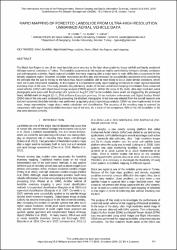Rapid mapping of forested landslide from ultra-high resolution unmanned aerial vehicle data
Özet
The Black Sea Region is one of the most landslide prone area due to the high slope gradients, heavy rainfall and highly weathered hillslope material conditions in Turkey. The landslide occurrences in this region are mainly controlled by the hydro-climatic conditions and anthropogenic activities. Rapid regional landslide inventory mapping after a major event is main difficulties encountered in this densely vegetated region. However, landslide inventories are first step and necessary for susceptibility assessment since considering the principle that the past is the key to the future thus, future landslides will be more likely to occur under similar conditions, which have led to past and present instability. In this respect, it is important to apply rapid mapping techniques to create regional landslide inventory maps of the area. This study presents the preliminary results of the semi-automated mapping of landslides from unmanned aerial vehicles (UAV) with object-based image analysis (OBIA) approach. Within the scope of the study, ultra-high resolution aerial photographs were taken with fixed wing UAV system on Aug 17, 2017 in the landslide zones which are triggered by the prolonged heavy rainfall event on August 12-13, 2016 at Bartin Kurucaşile province. 10 cm resolution orthomosaic and Digital Surface Model (DSM) data of the area were produced by processing the obtained photographs. A test area was selected from the overall research area and semi-automatic landslide detection was performed by applying object-based image analysis. OBIA has been implemented in three steps: image segmentation, image object metric calculation and classification. The accuracy of the resulting maps is assessed by comparisons with expert based landslide inventory map of the area. As a result of the comparison, 80% of the 240 landslides in the area were detected correctly
Kaynak
International Archives of the Photogrammetry, Remote Sensing and Spatial Information Sciences - ISPRS ArchivesCilt
42Sayı
3W4Bağlantı
https://dx.doi.org/10.5194/isprs-archives-XLII-3-W4-171-2018https://hdl.handle.net/11421/22938


















